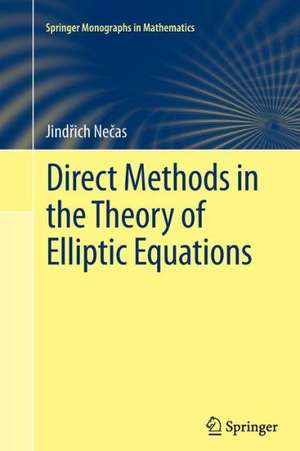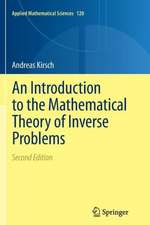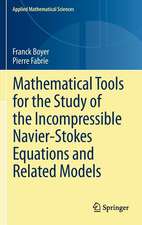Direct Methods in the Theory of Elliptic Equations: Springer Monographs in Mathematics
Autor Jindrich Necas Prefață de Šárka Necasová Contribuţii de Christian G. Simader Traducere de Gerard Tronel, Alois Kufneren Limba Engleză Paperback – 29 noi 2013
The volume gives a self-contained presentation of the elliptic theory based on the "direct method", also known as the variational method. Due to its universality and close connections to numerical approximations, the variational method has become one of the most important approaches to the elliptic theory. The method does not rely on the maximum principle or other special properties of the scalar second order elliptic equations, and it is ideally suited for handling systems of equations of arbitrary order. The prototypical examples of equations covered by the theory are, in addition to the standard Laplace equation, Lame’s system of linear elasticity and the biharmonic equation (both with variable coefficients, of course). General ellipticity conditions are discussed and most of the natural boundary condition is covered. The necessary foundations of the function space theory are explained along the way, in an arguably optimal manner. The standard boundary regularity requirement on the domains is the Lipschitz continuity of the boundary, which "when going beyond the scalar equations of second order" turns out to be a very natural class. These choices reflect the author's opinion that the Lamesystem and the biharmonic equations are just as important as the Laplace equation, and that the class of the domains with the Lipschitz continuous boundary (as opposed to smooth domains) is the most natural class of domains to consider in connection with these equations and their applications.
| Toate formatele și edițiile | Preț | Express |
|---|---|---|
| Paperback (1) | 731.10 lei 6-8 săpt. | |
| Springer Berlin, Heidelberg – 29 noi 2013 | 731.10 lei 6-8 săpt. | |
| Hardback (1) | 737.26 lei 6-8 săpt. | |
| Springer Berlin, Heidelberg – 6 oct 2011 | 737.26 lei 6-8 săpt. |
Din seria Springer Monographs in Mathematics
- 18%
 Preț: 1234.77 lei
Preț: 1234.77 lei - 18%
 Preț: 753.23 lei
Preț: 753.23 lei - 20%
 Preț: 574.70 lei
Preț: 574.70 lei - 24%
 Preț: 740.03 lei
Preț: 740.03 lei - 24%
 Preț: 777.43 lei
Preț: 777.43 lei - 20%
 Preț: 818.29 lei
Preț: 818.29 lei - 18%
 Preț: 969.93 lei
Preț: 969.93 lei - 20%
 Preț: 758.03 lei
Preț: 758.03 lei - 9%
 Preț: 904.20 lei
Preț: 904.20 lei - 15%
 Preț: 607.33 lei
Preț: 607.33 lei - 8%
 Preț: 529.41 lei
Preț: 529.41 lei - 24%
 Preț: 1598.61 lei
Preț: 1598.61 lei -
 Preț: 396.40 lei
Preț: 396.40 lei - 18%
 Preț: 793.14 lei
Preț: 793.14 lei - 15%
 Preț: 650.86 lei
Preț: 650.86 lei - 18%
 Preț: 1236.19 lei
Preț: 1236.19 lei - 15%
 Preț: 499.77 lei
Preț: 499.77 lei -
 Preț: 391.61 lei
Preț: 391.61 lei - 18%
 Preț: 1404.30 lei
Preț: 1404.30 lei - 18%
 Preț: 797.24 lei
Preț: 797.24 lei - 18%
 Preț: 916.25 lei
Preț: 916.25 lei -
 Preț: 397.01 lei
Preț: 397.01 lei - 15%
 Preț: 657.25 lei
Preț: 657.25 lei - 15%
 Preț: 467.79 lei
Preț: 467.79 lei - 15%
 Preț: 648.05 lei
Preț: 648.05 lei -
 Preț: 406.25 lei
Preț: 406.25 lei -
 Preț: 389.88 lei
Preț: 389.88 lei - 15%
 Preț: 649.54 lei
Preț: 649.54 lei - 15%
 Preț: 581.14 lei
Preț: 581.14 lei - 15%
 Preț: 643.48 lei
Preț: 643.48 lei - 15%
 Preț: 647.73 lei
Preț: 647.73 lei - 18%
 Preț: 902.55 lei
Preț: 902.55 lei - 15%
 Preț: 653.33 lei
Preț: 653.33 lei - 18%
 Preț: 901.88 lei
Preț: 901.88 lei - 18%
 Preț: 907.27 lei
Preț: 907.27 lei - 18%
 Preț: 893.53 lei
Preț: 893.53 lei - 15%
 Preț: 659.53 lei
Preț: 659.53 lei - 18%
 Preț: 802.28 lei
Preț: 802.28 lei - 15%
 Preț: 661.32 lei
Preț: 661.32 lei - 15%
 Preț: 646.62 lei
Preț: 646.62 lei -
 Preț: 384.48 lei
Preț: 384.48 lei - 15%
 Preț: 704.36 lei
Preț: 704.36 lei - 18%
 Preț: 1248.20 lei
Preț: 1248.20 lei - 18%
 Preț: 1031.17 lei
Preț: 1031.17 lei -
 Preț: 409.13 lei
Preț: 409.13 lei - 18%
 Preț: 986.01 lei
Preț: 986.01 lei - 15%
 Preț: 640.37 lei
Preț: 640.37 lei - 15%
 Preț: 643.34 lei
Preț: 643.34 lei -
 Preț: 388.72 lei
Preț: 388.72 lei - 18%
 Preț: 965.34 lei
Preț: 965.34 lei
Preț: 731.10 lei
Preț vechi: 891.59 lei
-18% Nou
Puncte Express: 1097
Preț estimativ în valută:
139.90€ • 152.44$ • 117.88£
139.90€ • 152.44$ • 117.88£
Carte tipărită la comandă
Livrare economică 23 aprilie-07 mai
Preluare comenzi: 021 569.72.76
Specificații
ISBN-13: 9783642270734
ISBN-10: 3642270735
Pagini: 388
Ilustrații: XVI, 372 p.
Dimensiuni: 155 x 235 x 20 mm
Greutate: 0.54 kg
Ediția:2012
Editura: Springer Berlin, Heidelberg
Colecția Springer
Seria Springer Monographs in Mathematics
Locul publicării:Berlin, Heidelberg, Germany
ISBN-10: 3642270735
Pagini: 388
Ilustrații: XVI, 372 p.
Dimensiuni: 155 x 235 x 20 mm
Greutate: 0.54 kg
Ediția:2012
Editura: Springer Berlin, Heidelberg
Colecția Springer
Seria Springer Monographs in Mathematics
Locul publicării:Berlin, Heidelberg, Germany
Public țintă
ResearchCuprins
1.Introduction to the problem.- 2.Sobolev spaces.- 3.Exitence, Uniqueness of basic problems.- 4.Regularity of solution.- 5.Applications of Rellich’s inequalities and generalization to boundary value problems.- 6.Sobolev spaces with weights and applications to the boundary value problems.- 7.Regularity of solutions in case of irregular domains and elliptic problems with variable coefficients.
Recenzii
From the reviews:
“The book includes many important results published as well as unpublished by several authors and results by J. Nečas himself. In addition, there are numerous bibliographical hints and many remarks, examples, exercises and problems. … the book continues to be one of the classics of the Sobolev space setting of linear elliptic boundary value problems. … the now available English translation will be widely used by young researchers.” (Joachim Naumann, Zentralblatt MATH, Vol. 1246, 2012)
“The book includes many important results published as well as unpublished by several authors and results by J. Nečas himself. In addition, there are numerous bibliographical hints and many remarks, examples, exercises and problems. … the book continues to be one of the classics of the Sobolev space setting of linear elliptic boundary value problems. … the now available English translation will be widely used by young researchers.” (Joachim Naumann, Zentralblatt MATH, Vol. 1246, 2012)
Notă biografică
Jindrich Necas, Professor Emeritus of the Charles University in Prague, Distinguished Researcher Professor at the University of Northern Illinois, DeKalb, Doctor Honoris Causa at the Technical University of Dresden, a leading Czech mathematician and a world-class researcher in the field of partial differential equations. Author or coauthor of 12 monographs, 7 textbooks, and 185 research papers. High points of his research include
- his contribution to boundary regularity theory for linear systems
- his contributions to regularity theory of variational integrals, such as his 1977 solution of a long-standing question directly to Hilbert’s 19th problem
- his contributions to mathematical theory of the Navier-stokes equations, including his 1995 solution of an important problem raised in a classical 1934 paper by J. Leray.
Textul de pe ultima copertă
Nečas’ book Direct Methods in the Theory of Elliptic Equations, published 1967 in French, has become a standard reference for the mathematical theory of linear elliptic equations and systems. This English edition, translated by G. Tronel and A. Kufner, presents Nečas’ work essentially in the form it was published in 1967. It gives a timeless and in some sense definitive treatment of a number issues in variational methods for elliptic systems and higher order equations. The text is recommended to graduate students of partial differential equations, postdoctoral associates in Analysis, and scientists working with linear elliptic systems. In fact, any researcher using the theory of elliptic systems will benefit from having the book in his library.
The volume gives a self-contained presentation of the elliptic theory based on the "direct method", also known as the variational method. Due to its universality and close connections to numerical approximations, the variational method has become one of the most important approaches to the elliptic theory. The method does not rely on the maximum principle or other special properties of the scalar second order elliptic equations, and it is ideally suited for handling systems of equations of arbitrary order. The prototypical examples of equations covered by the theory are, in addition to the standard Laplace equation, Lame’s system of linear elasticity and the biharmonic equation (both with variable coefficients, of course). General ellipticity conditions are discussed and most of the natural boundary condition is covered. The necessary foundations of the function space theory are explained along the way, in an arguably optimal manner. The standard boundary regularity requirement on the domains is the Lipschitz continuity of the boundary, which "when going beyond the scalar equations of second order" turns out to be a very natural class. These choices reflect the author's opinion that the Lamesystem and the biharmonic equations are just as important as the Laplace equation, and that the class of the domains with the Lipschitz continuous boundary (as opposed to smooth domains) is the most natural class of domains to consider in connection with these equations and their applications.
The volume gives a self-contained presentation of the elliptic theory based on the "direct method", also known as the variational method. Due to its universality and close connections to numerical approximations, the variational method has become one of the most important approaches to the elliptic theory. The method does not rely on the maximum principle or other special properties of the scalar second order elliptic equations, and it is ideally suited for handling systems of equations of arbitrary order. The prototypical examples of equations covered by the theory are, in addition to the standard Laplace equation, Lame’s system of linear elasticity and the biharmonic equation (both with variable coefficients, of course). General ellipticity conditions are discussed and most of the natural boundary condition is covered. The necessary foundations of the function space theory are explained along the way, in an arguably optimal manner. The standard boundary regularity requirement on the domains is the Lipschitz continuity of the boundary, which "when going beyond the scalar equations of second order" turns out to be a very natural class. These choices reflect the author's opinion that the Lamesystem and the biharmonic equations are just as important as the Laplace equation, and that the class of the domains with the Lipschitz continuous boundary (as opposed to smooth domains) is the most natural class of domains to consider in connection with these equations and their applications.
Caracteristici
A standard reference for the mathematical theory of linear elliptic equations and systems Originally published 1967 in French Any researcher using the theory of elliptic systems will benefit from this book Includes supplementary material: sn.pub/extras















